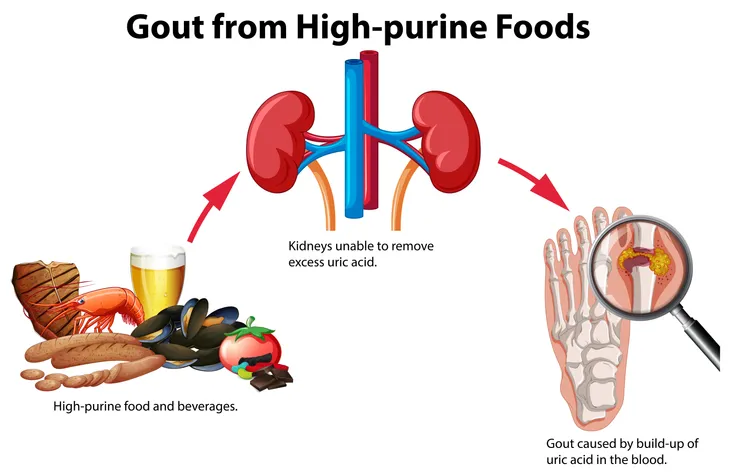Centuries ago, gout was known as the king’s disease or the rich man’s disease because it was supposed to be caused by a diet that only the wealthy aristocracy could afford — meat, fish, and alcohol. Indeed, having gout symptoms suggested that you had a high social and financial position, which seems ludicrous in light of our current understanding of health and money.
Gout may sound like an 18th-century disease, yet the number of Americans affected by this severe inflammatory condition has more than doubled in the last few decades. According to statistics, gout is now 15 to 30 times more common than it was 15-years ago and more young people are developing the disease. Age certainly has a role to play in the development of gout, but it is not the cause. Here’s what you need to know about “the rich man’s disease.”
What Does a “Poor Man’s Diet” Entail?
While we know foods like red meat, fish, and wine are the type of foods the wealthy could afford, this leads us to wonder, what did a “poor man’s diet” entail?
Peasants were constrained to eating only the items that they could farm at the time. Fresh vegetables, fruits, grains, nuts, and other natural foods containing complex carbs were included. Given this, the food of a peasant also appears to be both nutritious and enjoyable. So, what gives?
Our Understanding of Gout Has Come a Long Way
Over the years, we have developed a much better understanding of gout. Even though a well-balanced diet can include protein from both red meat and seafood, (and even wine!) for a gout sufferer, these foods can wreak havoc.
Gout is caused by prolonged raised uric acid levels in the body. Uric acid deposits around the joints and causes inflammation. Since the wealthy could typically only afford these types of indulgences this is how the disease got the name of the “rich man’s disease.”
Risk Factors for Gout
Certain factors can increase your risk for gout. For starters, gout is hereditary, which means that it can be handed down through families. Indulging in purine-rich meals such as anchovies, trout, turkey, veal, and liver can also cause gout to develop — primarily affecting the toes and producing acute pain and swelling.
Furthermore, people who are overweight, diabetic, and consume large amounts of alcohol are more likely to get gout. Having high cholesterol and high blood pressure are also risk factors.
Another interesting fact about gout is that men are 20 times more likely than women to acquire gout. It primarily affects men over the age of 30 and postmenopausal women.
Famous Historical Figures Who Suffered From Gout
It was assumed that only the wealthy could afford the disease’s associated rich foods, alcoholic beverages, and slow lifestyle. While we now know that diet, drink, and inactivity can all increase the risk of gout, genes play a larger role, and the stigma of overindulgence remains a barrier to treatment for some gout patients.
Gout is a lot more common than you may think and several famous historical figures even suffered from it. Let’s take a look at the past.
Benjamin Franklin
Benjamin Franklin was a scientist, inventor, politician, philanthropist, and businessman in America. He is well remembered for being the only Founding Father to sign all three documents that liberated America from British rule in 1776.
Franklin’s gender, genetics, diet, drinking, and lead exposure were all risk factors for elevated uric acid — a known cause of gout. He loved fatty foods and alcoholic beverages, particularly red meats, ultimately putting him at an even greater risk for developing it.
When Franklin entered middle age, he began eating a variety of meats, including beef, mutton, veal, and fish. Franklin was also very fond of wine. Despite the fact that he was aware of the potential consequences, he went ahead and indulged anyway.
The repercussions of his actions caused him a lot of agony in his later years, including a lot of gout bouts. In fact, Benjamin Franklin’s movement was drastically reduced as a result of these incidents, which caused him a great deal of discomfort. Franklin formed several connections between his activities and the agony he felt, despite being unaware of the link between uric acid and gout.
Sir Isaac Newton
Sir Isaac Newton, a physicist, and mathematician, is acknowledged as one of the great brains of the 17th-century Scientific Revolution for developing the concepts of modern physics, particularly the laws of motion. Newton’s Philosophiae Naturalis Principia Mathematica (Mathematical Principles of Natural Philosophy), which has been dubbed the single most significant book on physics, was published in 1687.
It turns out that Sir Isaac Newton was another historical figure to suffer from gout. In fact, he experienced gout attacks in both of his feet in 1725, barely two years before he passed away.
Charlemagne
From 768 until 814, Charlemagne, often known as Karl or Charles the Great, was a medieval monarch who ruled over much of Western Europe. He set out on a mission to unify the Germanic peoples into a single kingdom and to convert his subjects to Christianity. He was a superb military strategist who spent much of his reign fighting to achieve his objectives.
According to a clinical analysis of the Emperor’s final illnesses and death, he had osteoarthritis, gout, and a persistent fever caused by an infectious condition.
Charlemagne’s reign spanned all of Western Europe when he passed away in 814, and he had also ensured the survival of Christianity in the West. Some people today regard Charlemagne as the “Father of Europe.”
Alexander the Great
Alexander the Great, despite being the ruler of ancient Macedonia for only 13-years, changed the course of history. He built a massive empire that stretched from Macedonia to Egypt and from Greece to parts of India, making him one of the world’s greatest military generals.
Gout, dubbed “the sickness of kings and the king of diseases,” has afflicted many kings, including Alexander the Great.
 Photo Credit: Nenad Nedomacki / Shutterstock.com
Photo Credit: Nenad Nedomacki / Shutterstock.comMartin Luther
Martin Luther, a 16th-century monk, and theologian was one of Christianity’s most influential individuals. Martin Luther was a famous religious reformer, despite the fact that he was claimed to have suffered from a variety of illnesses during his lifetime.
He began to experience anginal discomfort, colic, and dysuria in his forties as a result of urinary uric acid stones, gout, and a left leg ulcer, all of which were caused by metabolic syndromes.
Gout Isn’t Just for Royals
Based on medical research, it’s pretty clear that gout is no longer limited to the social elite. People from all walks of life are affected. This is likely due to the fact that more of us have access to what was formerly called “luxury meals.”
Cases of gout around the world are on the rise as a result of the rising global intake of alcohol, sugary drinks, and energy-dense foods. Decreased physical exercise also plays a role.












